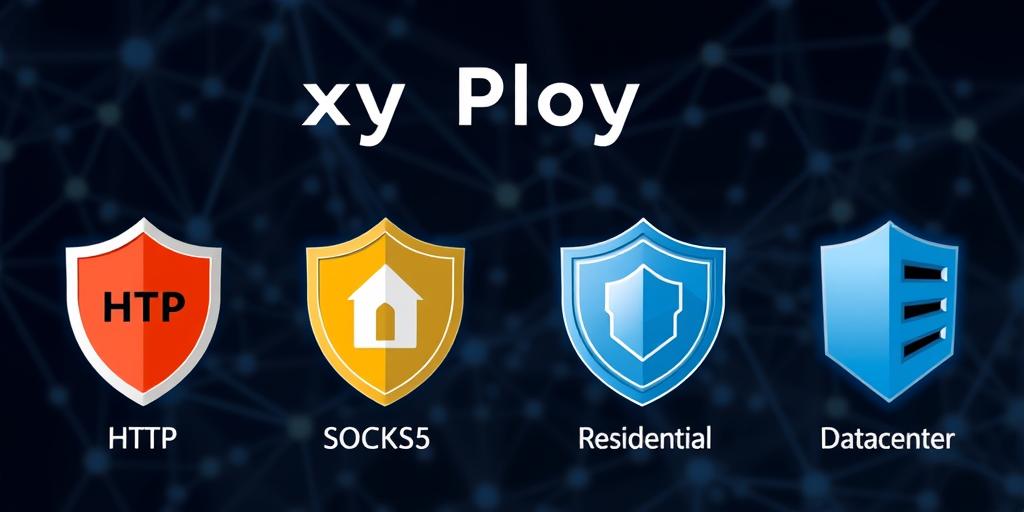Navigating the world of proxies can feel like choosing armor for online activities. Understanding the strengths and weaknesses of each type—HTTP, SOCKS5, residential, and datacenter—is crucial for effective online protection and anonymity. This guide breaks down each proxy type to help you choose the best shield for your needs.
HTTP Proxies: The Web Surfer's Basic Shield
HTTP (Hypertext Transfer Protocol) proxies are designed primarily for web traffic. They handle HTTP and HTTPS requests, making them suitable for general web browsing. When you use an HTTP proxy, your web requests are routed through the proxy server, which then fetches the content from the website and sends it back to you. This masks your IP address, providing a basic level of anonymity.
Advantages:
- Simplicity: Easy to set up and use with most web browsers.
- Compatibility: Works well with websites and web-based applications.
- Cost-Effective: Often available for free or at a lower cost compared to other proxy types.
Disadvantages:
- Limited Protocol Support: Only supports HTTP and HTTPS, not suitable for other types of internet traffic (e.g., FTP, SMTP).
- Lower Anonymity: May not encrypt all traffic, and some can be easily detected as proxies.
SOCKS5 Proxies: The Versatile All-Rounder
SOCKS5 is a more versatile proxy protocol that supports various types of traffic, including HTTP, HTTPS, SMTP, and more. Unlike HTTP proxies, SOCKS5 proxies do not interpret the traffic they handle, making them suitable for a wider range of applications, including streaming, gaming, and downloading files.
Advantages:
- Versatility: Supports various protocols and traffic types.
- Enhanced Security: Offers better encryption and authentication methods.
- Bypass Restrictions: Can bypass more sophisticated firewalls and geo-restrictions.
Disadvantages:
- Complexity: Slightly more complex to set up compared to HTTP proxies.
- Higher Cost: Generally more expensive than HTTP proxies.
- Performance Overhead: Encryption can sometimes reduce speed.
Residential Proxies: The Trusted Neighbor
Residential proxies use IP addresses assigned to real residential locations by Internet Service Providers (ISPs). This makes them appear as regular users, significantly reducing the chance of being blocked or detected by websites. Residential proxies are ideal for tasks that require high anonymity and trust, such as web scraping, ad verification, and social media management.
Advantages:
- High Anonymity: Harder to detect as proxies due to their residential IP addresses.
- Trustworthiness: Less likely to be blocked by websites.
- Geo-Targeting: Can target specific geographic locations for localized content.
Disadvantages:
- Cost: Generally the most expensive type of proxy.
- Speed: Can be slower due to traffic routing through residential connections.
- Ethical Concerns: Sourcing of residential IPs can sometimes be questionable.
Datacenter Proxies: The Speed Demon
Datacenter proxies come from data centers, which are facilities that house servers and networking equipment. These proxies offer high speeds and stability, making them suitable for tasks that require fast data transfer. However, they are easier to detect as proxies because their IP addresses are associated with data centers rather than residential locations.
Advantages:
- High Speed: Faster connections due to data center infrastructure.
- Stability: Reliable and consistent performance.
- Cost-Effective: More affordable than residential proxies.
Disadvantages:
- Lower Anonymity: Easily detected as proxies, leading to potential blocks.
- Limited Trust: Not suitable for tasks requiring high levels of trust or anonymity.
Choosing the Right Shield
The best proxy type depends on your specific needs and priorities:
- For Basic Web Browsing: HTTP proxies offer a simple and cost-effective solution.
- For Versatile Traffic Handling: SOCKS5 proxies provide broader protocol support and enhanced security.
- For High Anonymity and Trust: Residential proxies are ideal for tasks requiring a low detection rate.
- For Speed and Stability: Datacenter proxies offer fast and reliable connections for data-intensive tasks.
Understanding these differences allows you to select the proxy type that best fits your online activities, ensuring optimal protection and anonymity.









